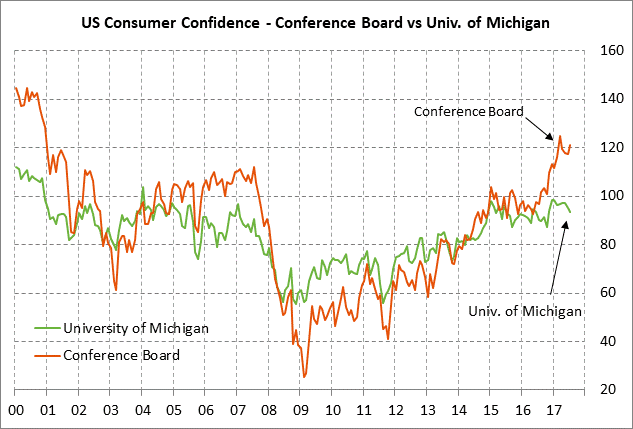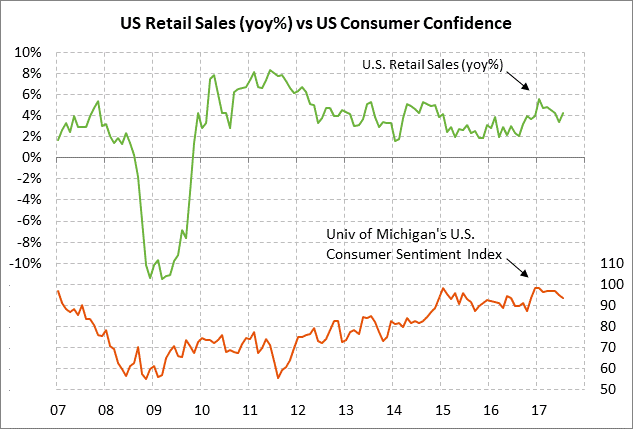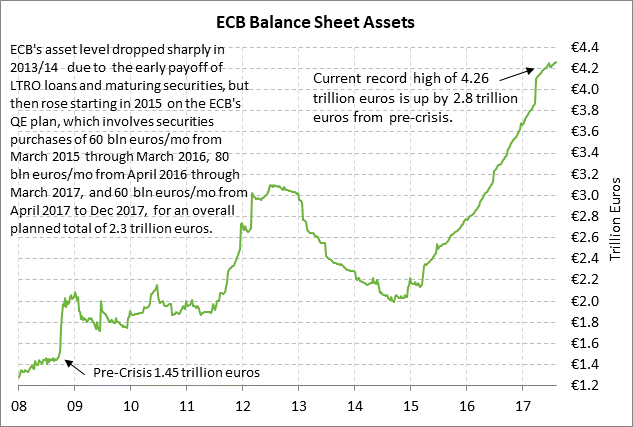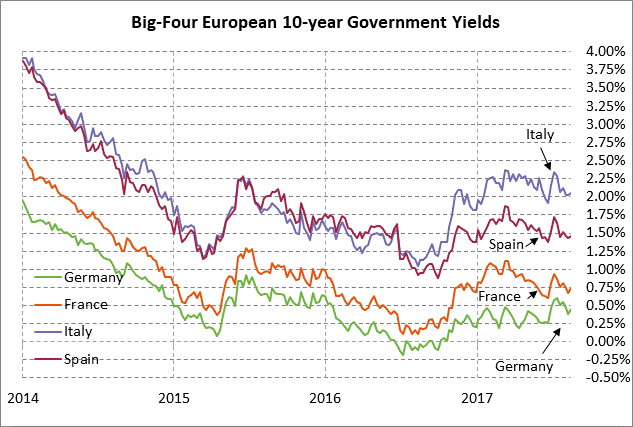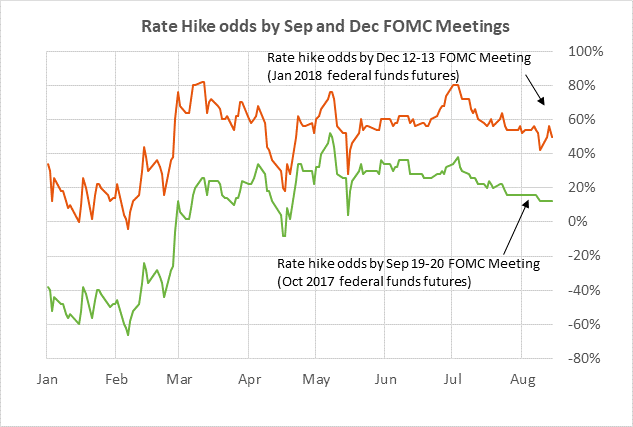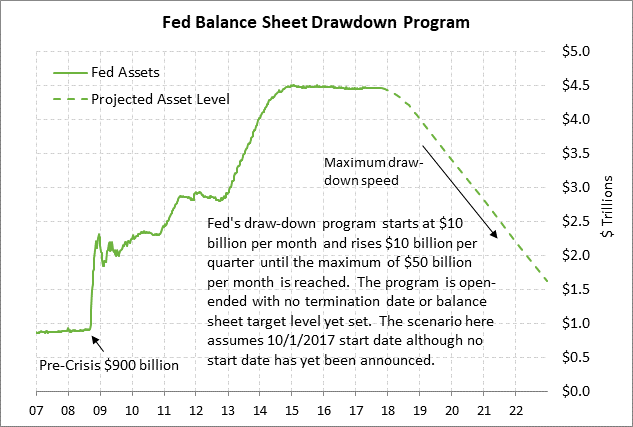- U.S. consumer sentiment expected to remain generally strong
- Next week’s Jackson Hole conference could offer ECB policy hints
- Preview of next week’s events
U.S. consumer sentiment expected to remain generally strong — The market consensus is for today’s preliminary-Aug University of Michigan U.S. consumer sentiment index to show an increase of +0.6 points to 94.0, recovering part of July’s -1.7 point decline to 93.4. The index surged to a 13-1/2 year high of 98.5 in January after the Nov 2016 presidential election, but has since fallen back to the 93.4 level mainly because of the lack of progress on the Republican agenda. Still, the current index of 93.3 is +6.1 points above the 87.2 level seen before the Nov election.
Supportive factors for U.S. consumer sentiment include (1) the strong labor market and improved Q2 GDP growth, (2) rising household wealth due to record highs in the stock market and rising home prices, (3) ongoing hopes for a personal tax cut, and (4) low gasoline prices.
Negative factors for consumer sentiment include (1) geopolitical tensions with North Korea, (2) the recent downward correction in stocks, and (3) the prospects for steadily higher interest rates over the next few years as the Fed raises its funds rate target.
Next week’s Jackson Hole conference could offer ECB policy hints — The Kansas City Fed’s annual monetary policy conference in Jackson Hole, Wyoming, will be held next Thursday-Saturday (Aug 24-26). The recent news that ECB President Draghi will be attending next week’s Jackson Hole conference stirred some talk that Mr. Draghi may want to convey some policy news to the markets ahead of the ECB’s next policy meeting on Sep 7.
The market believes that there is a strong chance that the ECB at its Sep 7 meeting will announce plans to taper its QE program during the first six to nine months of 2018. The ECB has announced so far that its 60 billion-euro-per-month QE program will last through December 2017, which means the time is approaching when the ECB needs to tell the markets about its plans for QE in 2018. The ECB could delay the QE announcement until the following meeting on Oct 26, but the next meeting on Dec 14 would be too late for a heads up on the QE program’s fate in 2018.
The markets were a bit surprised on Thursday when ECB members expressed concern about the strength of the euro. “The appreciation of the euro to date could be seen in part as reflecting changes in relative fundamentals in the euro area vis-a-vis the rest of the world†but “concerns were expressed about the risk of the exchange rate overshooting in the future,†according to the ECB’s account of its July 19-20 policy meeting.
The ECB’s statement could be considered verbal intervention against the euro, which has appreciated by +11% this year against the dollar and by +17% against a trade-weighted basket of currencies. However, it remains unclear whether the ECB would be willing to take the dovish action of deferring QE tapering in order to curb the euro’s gains.
The ECB’s account of the July 26 meeting also said that “the point was made that, looking ahead, the Governing Council needed to gain more policy space and flexibility to adjust policy and the degree of monetary policy accommodation, if and when needed, in either direction.†This suggested that the ECB may announce only short-term action on tapering its QE program so that it can adjust the program more frequently in order to address conditions as they develop.
Mr. Draghi in his speech on June 27 in Sintra, Portugal sparked a sharp increase in Eurozone bond yields when he said that reflationary forces have replaced deflationary forces and made other comments to suggest that he was starting to lay the groundwork for a QE tapering announcement. However, Eurozone bond yields have since fallen and retraced most of their Sintra gains as ECB officials in general have kept up their dovish talk.
The markets will also be carefully listening for any U.S. monetary policy hints at the Jackson Hole conference. Fed chair Janet Yellen and Vice Chair Stanley Fischer will both attend next week’s Jackson Hole conference, according to NY Times, along with other FOMC officials. The markets are eagerly waiting to hear if the FOMC at its next meeting on Sep 19-20 will announce a start-date for its balance sheet normalization plan. That start date may come as soon as Oct 1, although the Fed may delay that start date if Congress has not yet raised the debt ceiling. The odds are only at 12% for a Fed rate hike at the next meeting on Sep 19-20, but those odds then rise to 18% for the Oct 31/Nov 1 meeting, and 50% by the Dec 12-13 meeting.
Preview of next week’s events — Next week’s economic calendar is relatively light and the markets will continue to focus mainly on geopolitical risks and central bank policy with the Thursday/Saturday Jackson Hole conference.
Key U.S. economic reports next week include (1) Tuesday’s June FHFA home price index, (2) Wednesday’s July new home sales report (expected unchanged after June’s +0.8%), (3) Thursday’s July existing home sales report (expected +0.7% after June’s -1.8%), and (4) Friday’s July durable goods orders report (expected -5.8% and +0.5% ex-transportation after June’s +6.4% and +0.1% ex-transportation).
The Treasury next week will sell 2-year floating-rate notes on Wednesday and 5-year TIPS on Thursday. There are only 16 of the S&P 500 companies that report earnings next week since Q2 earnings season is now virtually over. Q2 earnings for the S&P 500 companies were strong at +12.0% y/y (+9.3% ex-energy).

